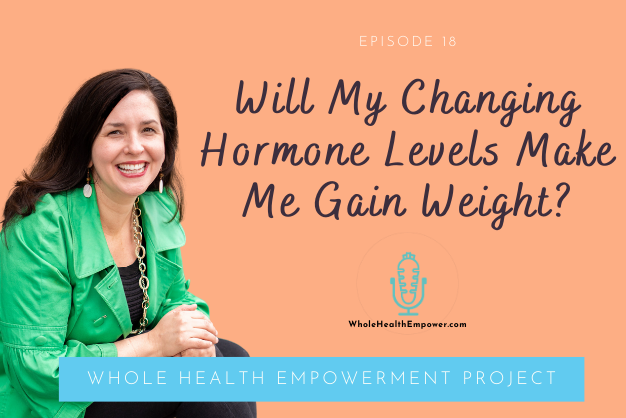In today’s episode we will be talking about that time period before menopause when we start to feel and see a noticeable change in our bodies. During perimenopause, levels of the female hormones estrogen and progesterone start to fluctuate erratically and result in hot flashes, irregular periods, night sweats, mood changes, irritability, and fatigue. These fluctuating hormones also put us at risk for weight gain and osteoporosis, due to loss of bone mass with decrease in estrogen levels. We will talk about why these changes are happening to our bodies and review lifestyle factors that can help ease the symptoms.
Episode Resources:
Will my changing hormone levels make me gain weight? Listen in for some real talk!
By: Tricia Stefankiewicz
In today’s episode we will be talking about that time period before menopause when we start to feel and see a noticeable change in our bodies. During perimenopause, levels of the female hormones estrogen and progesterone start to fluctuate erratically and result in hot flashes, irregular periods, night sweats, mood changes, irritability, and fatigue. These fluctuating hormones also put us at risk for weight gain and osteoporosis, due to loss of bone mass with decrease in estrogen levels. We will talk about why these changes are happening to our bodies and review lifestyle factors that can help ease the symptoms.
This stage is caused by perimenopause and is the time in which your body starts to make a transition towards menopause. It can happen at any age, although, most women report symptoms in their late 30’s and into their 40’s. This amount of time spent in this stage varies greatly and can last a few months to many years, as your body starts to make the transition into menopause. This article will talk generally about hormones, weight gain, and loss of bone mass. If you are experiencing other symptoms not mentioned in this review, please consult your medical team for suggestions.
What is happening to our bodies?
Fluctuating Hormone Levels
During peak reproductive years, our hormones fluctuate at a predictable rate. For most of us, we kind of know when our period will happen each month. However, as we start to make the transition away from reproducing, our hormones fluctuate at an unpredictable rate causing irregular periods to occur. We may even notice that we are experiencing PMS like symptoms but then no period arrives that month.
During perimenopause, levels of the female hormones estrogen and progesterone start to fluctuate erratically and result in hot flashes, irregular periods, night sweats, mood changes, irritability, and fatigue. These fluctuating hormones also put us at risk for weight gain and osteoporosis, because we start to lose bone mass with decrease in estrogen levels.
Weight Gain
During this time, you may experience weight gain. This is due to an increase in ghrelin, the appetite “hunger” hormone, and decrease in leptin, the hormone that helps control hunger. These changes may result in increased snacking as well as a craving for fatty and high sugar food items which tend to be higher in calories. These changes, coupled with a decrease in activity level related to home life demand can lead to weight gain. Many women hold subcutaneous fat in their lower body for reproductive purposes that helps protect our muscle and bones. As we transition into menopause, however, we may notice that our waistlines begin to expand. With low estrogen levels, we start to store visceral fat in our abdomen leaving us with a bigger belly than what we are used to. This visceral fat is more harmful than subcutaneous fat on our hips as it surrounds our organs. In addition, the decline in estrogen levels also results in an increase in bad cholesterol which can lead to heart disease. Weight gain and an increase in visceral fat around the abdomen can lead to complications such as DM, heart disease, and put you at increased risk for some cancers including breast and colon.
Decrease in muscle mass.
For a lot of us, life is busy, we are less active, and have achy joints due to past injuries. We may notice that even though we are eating the same amount we are continuing to gain weight. Or you may weigh the same as always but suddenly your clothes are tighter fitting. Does any of this sound familiar? This is caused by a redistribution of fat and muscle mass. You may have an increase in visceral fat, and a loss of muscle mass that happens as we age. This shift however results in weight gain.
How is this possible? Muscle mass helps burn calories at rest. As we age and lose muscle mass, and gain more fat, we expend LESS calories at rest. This results in a slower metabolism and requirement for fewer calories throughout the day. This is why even if you eat the same amount of calories per day you gain weight over time. This redistribution of less muscle and more fat is why your previously fitting clothes are now tighter. By the time we are in our 40’s we slowly start to lose bone mass as well. As menopause strikes, bone loss becomes much greater. Research suggest we can even lose as much as 20% of our total bone density during this time leading to osteoporosis risk.
Scary right. What can you do to ease the burden of these changes and help ease the symptoms you may be experiencing?
Healthy Eating
The things you choose to eat can help decrease risk of factors related to hormonal changes including weight gain, osteoporosis, heart disease and diabetes mellitus (DM) risk development.
What does healthy eating entail?
- Eat a diet high in fruits, veggies, and whole grains. Recommend minimum of 3-5 serving fruits/veggies/day. These foods are high in fiber. Fiber help combat insulin resistance which decreases diabetes mellitus (DM) risk. Fiber also allows us to feel full which is important with the out of whack hunger and full hormones circulating.
- Make sure to get enough calcium in your diet – at least 2 servings a day from calcium rich foods each day to prevent bone loss and osteoporosis.
- Women under the age of 50 require 1,000 mg of calcium & 400-800 IUs of vitamin D daily. Vitamin D is important as it helps absorb the calcium consumed. You are likely getting some calcium and vitamin D from the multi-vitamin you are taking but may also need to eat enough calcium and vitamin D in your diet.
- Calcium rich food items include milk products (cheese, yogurt, ice cream, and milk), and other non-milk sources such as salmon, kale, sardines, fortified OJ and fortified breakfast cereals.
- Vitamin D food sources include fatty fish (salmon, tuna, mackerel), fortified milk products and cereals. Other sources of vitamin D include sunlight exposure in summer months.
- Limit the amount of alcohol and caffeine consumed daily to reduce hot flash symptoms and poor sleep.
- Too much alcohol can add calories to your daily intake and promote poor sleep schedule which has also been associated with weight gain
- Look at how much you are eating. If you have a mostly sedentary lifestyle, you may NOT need as many calories per day as you previously did especially if you have less lean muscle mass.
Regular Physical Activity
I have talked a lot about exercise on this podcast, so for a more in-depth look – go to Episodes 6 and 16.
Consistent physical activity is important during this period and it helps maintain weight, manage stress, and increase muscle and bone mass, all of which are essential during this time.
Increased aerobic activity such as walking or running is important as it help manage the day to day stress you may be undergoing, as well as helps with weight management. In addition, regular physical activity also helps reduce the visceral fat you may find around your waistline.
Increased strength training routine is also important as it helps increase muscle mass and therefore metabolism, which then in turn may increase the amount of calories you require at rest daily.
Practice Stress Reduction
When we are in a constant state of stress, it can lead to chronic inflammation in our bodies. With this chronic stress, our bodies release a stress hormone called cortisol. Cortisol can lead to an increase in hunger and desire for high fat foods – this in turn can lead to weight gain, fatigue and visceral fat storage. Practicing ways to reduce chronic stress help improve sleep, decrease circulating cortisol levels, and help manage our weight. Examples of how to reduce stress can include incorporation of one of the following: physical activity, yoga, meditation, coloring, reading, journaling, tai chi, or acupuncture.
As you can see, these lifestyle suggestions are all interrelated as each behavior recommended can help manage other symptoms you may be experiencing with fluctuating hormone levels. For instance, managing stress with exercise helps decrease cortisol levels and helps with the dreaded weight gain that may occur. Managing these symptoms now will not only allow for promotion of a healthy lifestyle but will also help manage these symptoms as you move into menopause.
Do you see any changes that you could implement to allow you to feel more in control of these symptoms. Start by implementing small changes, seeing what works, make changes, and then continue to build and create a foundation that works for you. There is no “right or wrong” way to do this. It’s more of what is right for you and what changes you can maintain for the long term. Even a 1% change in your behavior today, coupled with additional small changes, can lead to a compounded profound improvement in your health over the next year. Just start. Done is better than perfect. Whole Health is not an impossibility – but only you can make it happen. I don’t have it figured out, but I know I can do a better job than I am doing now. You may feel that way too. Be kind to yourself friends and I’ll see you back here next week.

